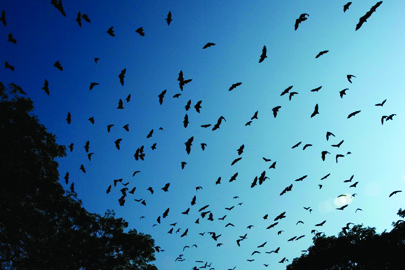Epstein ’96: Ebola outbreak a 'call to arms' for disease prevention
 Jonathan Epstein
Jonathan EpsteinA bat colony swarms at dusk in Bangladesh.
The Ebola outbreak in West Africa has killed more than 1,000 people, ground the economy of three countries to a halt and incited panic across the globe. The World Health Organization has called it a global crisis. It is the largest and most widespread Ebola outbreak on record and it could have been prevented, says Jonathan Epstein ’96, a veterinarian and epidemiologist.
"This outbreak is a wake up call," says Epstein, an associate vice president of conservation medicine at EcoHealth Alliance, an international conservation and public health science organization. "Ebola has now shown that it’s not just a disease that causes outbreaks in remote parts of Africa and fizzles out. We’ve seen it has the potential to get out of control and spread internationally. But by understanding how the disease spills over from animals to humans, we can get ahead of the game and prevent future outbreaks."
Epstein works on the front lines of zoonotic diseases, illnesses that spread from animals to humans. He has traveled the globe, researching a deadly role call of SARS, Nipah, Ebola, H1N1 and others. The severity and reach of this current outbreak can be attributed to multiple factors, Epstein says.
The hunting of wild animals is both a tradition and a necessity in West Africa, where many rural communities live in poverty with little access to food and supplies. Misinformation, lack of information, fear and cultural practices have all contributed to the ongoing spread of Ebola virus. That coupled with a mistrust of aid workers has proven to be a major impediment to containing this outbreak. Isolation and quarantine of patients is critically important for containing the Ebola virus, says Epstein, but when diagnosed, many patients have fled their villages and taken refuge in cities, spreading the disease in the cramped confines of urban living, eventually reaching a city with an international airport.
Response so far has been containment but that is only so effective, Epstein says.
"Prevention is more effective than trying to contain pandemics," he says.
The first step towards prevention is understanding which animals carry the virus. The suspected culprits in this case are bats, animals believed to be Ebola carriers, and a traditional food source of some West African peoples. But this strain could also have jumped from the carcass of another animal that may have been infected by bats, as was the case in Central Africa where great apes and small antelopes that died from Ebola were collected and consumed by hunters.
Understanding which animals are carriers of zoonotic diseases and which animals are hunted or scavenged by local people could predict the next location of an outbreak.
"A lot of the time, the practice of hunting and scavenging wild animals is done out of necessity," Epstein says. "It isn’t realistic to say, stop hunting wildlife because there is no alternative. We need to come up with realistic alternatives that work with the local frame work."
The next step is education, Epstein says. Simple solutions like hand washing after handling or butchering an animal may go a long way in preventing infection and outbreaks.
Zoonotic diseases are a global problem and need global solutions, Epstein says.
Population expansion, intensive livestock farming, urbanization and climate change are pushing humans and animals into closer proximity, increasing the chances of disease spillover and, with more connectivity across the globe, international outbreak.
“Ebola represents one of many wildlife viruses that have spilled over to humans. It may not be a major threat to the United States or Europe because of our strong public health infrastructure but eventually one will come along with high mortality, high transmissibility, and the ability to cause significant disease globally,” Epstein says. "But if we can find ways to prevent spillover from happening in the first place, which means changing the way we encroach upon and interact with wildlife and intact ecosystems, then we’ll be able to protect ourselves from the diseases we know about and those we have yet to discover."





